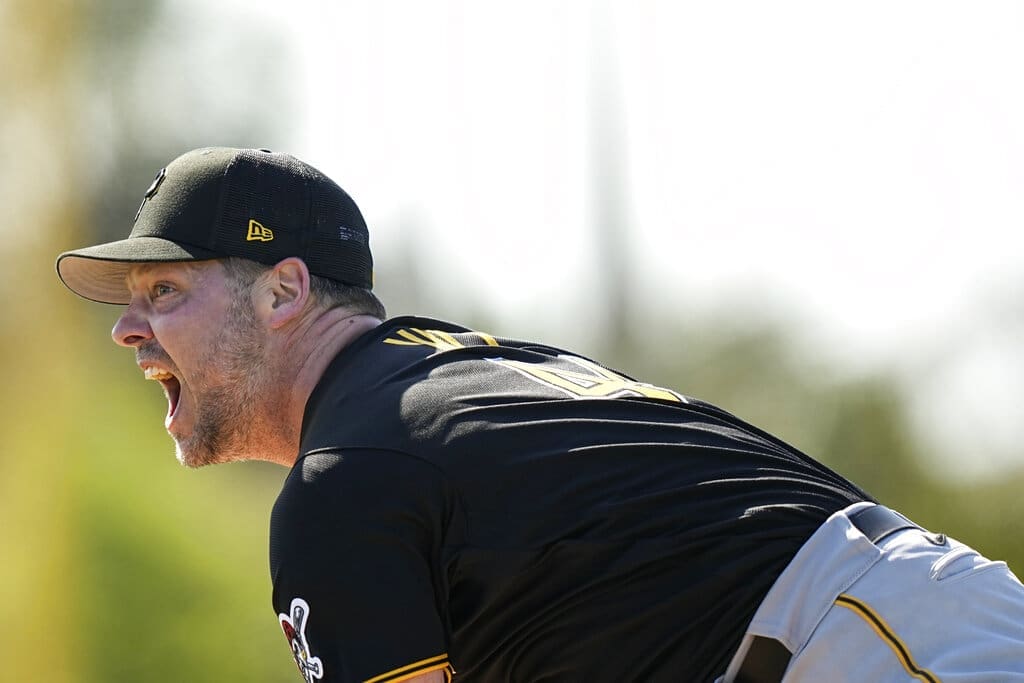Pirates
Perrotto: Why Rich Hill Keeps Evading Father Time

Today marks the Pittsburgh Pirates’ 35th day of spring training.
They still have eight more days in Bradenton, Fla. After that is the regular season in which 162 games are crammed into 184 days.
The last game of the season isn’t until Oct. 1 when the Pirates host the Miami Marlins at PNC Park. That seems 10 years away at this point.
Being in professional sports is time-consuming, regardless of the sport. The athletes are compensated very well at the highest levels while traveling on charter flights and staying in luxury hotels.
However, it can still be a difficult life. Athletes are away from their immediate families quite a bit and might not see members of their extended families at any time other than during the offseason.
Yet Pittsburgh Pirates left-hander Rich Hill keeps coming back for more.
The 43-year-old is set to embark on his 22nd professional season when the Pirates start the season a week from Thursday by visiting the Cincinnati Reds at Great American Ball Park. He will be the oldest player in the big leagues.
Hill made his major-league debut in 2005. To get a sense of how long ago that was, Lloyd McClendon was the Pirates’ manager and Jason Bay was their best player.
Hill is still going at an age when most players have long retired – or long been retired by the game.
One of the most obvious reasons Hill continues to play is because he signed a one-year, $8-million contract with the Pirates in the offseason as a free agent. It would be hard to walk away from baseball and find another job that pays that kind of money.
However, Hill has also earned over $67 million in his career. So, it’s not like he is one step away from destitution.
So, what keeps him coming back for more each season? Mainly, it’s because he will never likely find a job so challenging, regardless of the pay.
“It’s the competition,” Hill said. “It’s really tough to replicate the competition. I can’t imagine anything being more competitive than professional athletics. You can’t even come close to this level of competition in any other profession. So, that probably more than anything, is why I keep playing. I just love the competition.”
Another reason Rich Hill keeps going is his love of the game.
Yes, the money is great, and he wouldn’t do this for volunteer work. However, he fell in love with baseball as a little boy growing up in Milton, Mass., and that love affair remains strong.
“I’m really passionate about baseball,” Hill said. “I enjoy the game. I love playing the game. It’s still fun for me. I like to go out there and try to get the better of the hitters. Again, there’s where the word competition pops up right away again. The competitive aspect is what it makes so fun – and, at times, frustrating.”
Hill is obviously still in good physical shape to be able to pitch in the major leagues at his age.
Teams have also managed his workload carefully as he has gotten older. For example, Hill pitched just 124.1 innings over 26 starts for the Boston Red Sox last season, an average of just under five innings an outing.
The Pittsburgh Pirates, too, will key an eye on Hill’s workload.
Yet, even with precautions, players lose the battle to Father Time eventually. Hill somehow keeps pushing back the hands of time.
“I’m proud to be able to still be able to pitch in the major leagues at my age,” Hill said. “Not a lot of guys can do that. It’s eventually an act of attrition. Your chances of playing another season get a little worse each year.
“What I’ve been able to do is embrace the grind, whether it’s doing what I have to do in the offseason to get ready for another season and do everything I can during the season to stay in the best shape possible. It can be a grind if you let it and the key is not to let it be a grind.”
A wise veteran, Hill has indeed found a way to keep the long season from getting too boring.
“We’re going at it more than 200 days a year when you take into consideration the start of the spring training,” Hill said. “That seems pretty daunting if you look at it that way. I try to break spring training and the season into incremental, small pieces and that makes it a lot easier to handle. And it makes it a lot more fun.
“At the end of the day, it’s about putting up results and getting numbers but it’s really not about the results as much as it is about the process because if you go through the process and you understand how the process works, and you understand yourself, you know those other things will follow up with results.”
And, in Rich Hill’s case, enable him to somehow keep pushing the sun a little higher into the sky.













